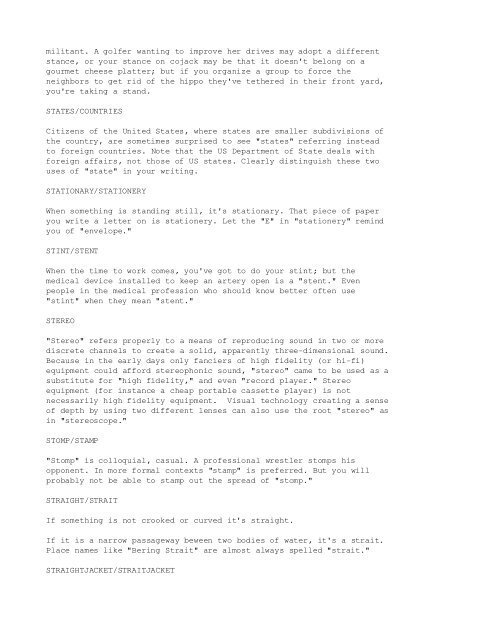Common_Errors_in_English_usage
Common_Errors_in_English_usage
Common_Errors_in_English_usage
You also want an ePaper? Increase the reach of your titles
YUMPU automatically turns print PDFs into web optimized ePapers that Google loves.
militant. A golfer want<strong>in</strong>g to improve her drives may adopt a different<br />
stance, or your stance on cojack may be that it doesn't belong on a<br />
gourmet cheese platter; but if you organize a group to force the<br />
neighbors to get rid of the hippo they've tethered <strong>in</strong> their front yard,<br />
you're tak<strong>in</strong>g a stand.<br />
STATES/COUNTRIES<br />
Citizens of the United States, where states are smaller subdivisions of<br />
the country, are sometimes surprised to see "states" referr<strong>in</strong>g <strong>in</strong>stead<br />
to foreign countries. Note that the US Department of State deals with<br />
foreign affairs, not those of US states. Clearly dist<strong>in</strong>guish these two<br />
uses of "state" <strong>in</strong> your writ<strong>in</strong>g.<br />
STATIONARY/STATIONERY<br />
When someth<strong>in</strong>g is stand<strong>in</strong>g still, it's stationary. That piece of paper<br />
you write a letter on is stationery. Let the "E" <strong>in</strong> "stationery" rem<strong>in</strong>d<br />
you of "envelope."<br />
STINT/STENT<br />
When the time to work comes, you've got to do your st<strong>in</strong>t; but the<br />
medical device <strong>in</strong>stalled to keep an artery open is a "stent." Even<br />
people <strong>in</strong> the medical profession who should know better often use<br />
"st<strong>in</strong>t" when they mean "stent."<br />
STEREO<br />
"Stereo" refers properly to a means of reproduc<strong>in</strong>g sound <strong>in</strong> two or more<br />
discrete channels to create a solid, apparently threedimensional sound.<br />
Because <strong>in</strong> the early days only fanciers of high fidelity (or hifi)<br />
equipment could afford stereophonic sound, "stereo" came to be used as a<br />
substitute for "high fidelity," and even "record player." Stereo<br />
equipment (for <strong>in</strong>stance a cheap portable cassette player) is not<br />
necessarily high fidelity equipment. Visual technology creat<strong>in</strong>g a sense<br />
of depth by us<strong>in</strong>g two different lenses can also use the root "stereo" as<br />
<strong>in</strong> "stereoscope."<br />
STOMP/STAMP<br />
"Stomp" is colloquial, casual. A professional wrestler stomps his<br />
opponent. In more formal contexts "stamp" is preferred. But you will<br />
probably not be able to stamp out the spread of "stomp."<br />
STRAIGHT/STRAIT<br />
If someth<strong>in</strong>g is not crooked or curved it's straight.<br />
If it is a narrow passageway beween two bodies of water, it's a strait.<br />
Place names like "Ber<strong>in</strong>g Strait" are almost always spelled "strait."<br />
STRAIGHTJACKET/STRAITJACKET





